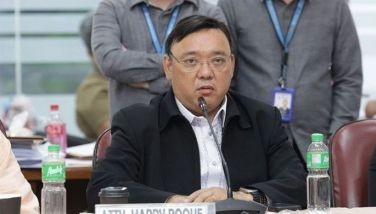Defaults on cronyville payments hurt Baguio
November 22, 2000 | 12:00am
(Conclusion) |
The city government, according to the 25-year renewal lease agreement between CJHDEVCO and the Bases Conversion Development Authority (BCDA), gets 25 percent or P106.25 million of the annual lease payment for development projects.
Councilors Richard Cariño and Lilia Yaranon said CJHDEVCO’s unpaid lease grew to P1.275 billion, covering payments due for 1998, 1999 and 2000. CJHDEVCO was able to pay its annual obligation only in 1997, a year after it signed the John Hay lease agreement.
Earlier, Federico Alquiros, CJHDEVCO general manager, said they asked BCDA for a moratorium on lease payments since the BCDA failed to deliver some portions of the original lease area and government agencies failed to immediately issue the necessary permits for development.
Yaranon believes that CJHDEVCO asked for a reprieve on payments because of insolvency. He noted that Fil-Estate, a major partner of the CJHDEVCO consortium, is suffering from maturing debt obligations. It needs the John Hay project as a bargaining chip to persuade its creditors to extend its loans.
Yaranon also cannot understand how CJHDEVCO could be given a moratorium on payments when Mimosa Resort at Clark Air Base in Pampanga, a similar project, was ejected when its delinquent rentals reached P325 million. Worst, despite its delinquency, BCDA decided to tap cash-strapped Fil-Estate to develop and lease 233 hectares of the 800-hectare Poro Point Special Economic and Freeport Zone in San Fernando, La Union.
BCDA late last year contracted a Fil-Estate-led Filipino-Belgian consortium to develop 233 hectares of the 800-hectare Poro Point Special Economic and Freeport Zone in exchange for a 24-year lease. The consortium is composed of CJHDEVCO, Bulk Handlers Incorporated and IPEM of Belgium.
"How can a company that asked for a moratorium in paying its lease be tapped to infuse a large amount of money on another project?" Yaranon asked.
The DENR declared Camp John Hay a forest and watershed reservation on June 29, 1993, one of eight forest reserves and watershed areas in Baguio City.
In April this year, the CJHDEVCO admitted having felled 77 pine trees in the Voice of America compound. Non-government organizations have lambasted the DENR for giving the company a permit to cut trees. Fredric Villanueva, DENR regional Environmental Management Bureau (EMB) chief, said the permit was granted by the EMB’s main office in Quezon City. This was irregular, as such permits should be given by the regional DENR office rather than the head office.
Baguio environmentalists point out that under the Bases Conversion Development Act, tree-cutting in military reservations is allowed only to prevent forest fires. Moreover, residents say they were never consulted about the development of the VOA area and its adverse impact on surrounding communities. Directly affected by the development of the VOA compound are the neighboring communities of Loakan-Apugan, Loakan proper and Happy Hollow.
In CJHDEVCO’s case, they say, the DENR granted at least two tree-cutting permits: one to convert the Camp John Hay golf course into a Jack Nicklaus-designed golf course, and another to clear the VOA area.
The DENR issued a permit to cut the trees in February this year, when CJHDV had yet to be granted an environmental clearance certificate (ECC) to develop the area. The ECC was approved only three months later, on May 26, and it required CJHDEVCO to conduct a 100 percent inventory of trees within the VOA compound. By then, the trees had already been cut.
What is also questionable about the ECC is the fact that it may have been approved on the same day that CJHDEVCO filed its ECC application. DENR records show Official Receipt No. 2187421 which shows that CJHDEVCO paid for a P200 procedural screening fee, P460 filing and a P2,100 processing fee on May 26, 2000, the same day that the ECC was granted. Official receipt No. 2187308 also shows that CJHDEVCO paid for its P240 legal research on the same day.
It is not clear whether the Housing and Land Urban Regulatory Board (HLURB) has issued the necessary permits as of today. As of last Nov. 6, CJHDEVCO did not have and had not applied for a certificate of registration and license to sell from the Cordillera HLURB. Cordillera HLURB officials here said all John Hay papers including the VOA applications were sent to its Manila office.
"Hands-off na kami diyan (This is not in our hands anymore)," said a high official of the Cordillera HLURB. "We should have been the ones to recommend action on these papers. But we were told that since the John Hay project is a national project, then HLURB Manila should take care of this."
It also appears that CJHDEVCO violated local government regulations on the construction of buildings or residences. On April 10, the Baguio city engineer’s office issued Building Permit 20-00-000237 for the construction of a total of 70 log cabins inside Camp John Hay. Forty-five of these were to be located at the former Commander’s Area while the remaining 25 are the VOA log cabins. Under local government rules, developers must secure one building permit for every structure being built.
A CJHDEVCO document showed that the company sold or reserved the VOA log cabins to the cronies even before it was granted the right to develop the area. The VOA Log Homes Project Executive Brief as of November 30, 1999 —six months before the ECC was issued —showed that 16 log cabins were either sold to or reserved by:
1.Manta Equities
2.Ricky Razon
3.FPJ
4.Frederick Dy
5.M. Pangilinan
6.Jacinto Ng
7.Lucio Tan
8.Wilson Sy
9.M. Villar
10.William Gatchalian
11.Ramon Ang
12.Dante Tan
13.Willie Ocier
14.Jaime Dichaves
15.Manny Tan
16.Lucio Co.
Eight log homes were listed as "open" while another was reserved by CJHDEVCO itself.
A project status report as of July 31, 2000 showed that lots inside the VOA compound were turned over to the buyers even before the CJHDEVCO was granted an ECC and a permit to enter the VOA area.
BrandSpace Articles
<
>
- Latest
- Trending
Trending
Latest
Trending
Latest
Recommended




























